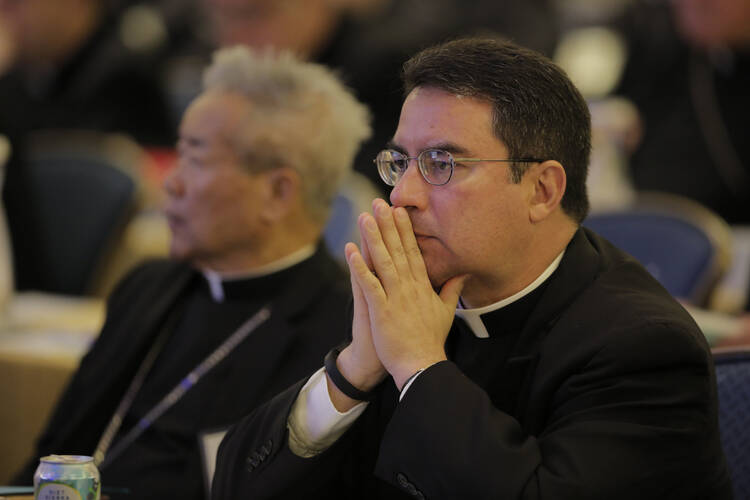The proverbial plate is full of issues for U.S. bishops to tackle at their upcoming spring assembly on June 14-15 in Indianapolis.
They will discuss issues ranging from immigration to religious freedom, as well as the Synod of Bishops on youth and the Fifth National Encuentro gathering, both coming up in 2018.
"We're certainly going to talk about the upcoming convocation in Orlando, some of the specific plans," said Bishop Oscar Cantu of Las Cruces, New Mexico, referring to the "Convocation of Catholic Leaders: The Joy of the Gospel in America" July 1-4 in Orlando, Florida. "Other topics of interest for all of the bishops have been the fifth Encuentro, coming up in 2018, how things are developing in that."
Bishop Cantu, chairman of the Committee on International Justice and Peace of the U.S. Conference of Catholic Bishops, will address the persecution of Christians abroad.
"With regard to our bishops' meeting, there is the concern of the plight of Christians in parts of the world where they've been persecuted, whether it's in Africa or Syria or in any other part of the world," he said.
Bishop Cantu said he will give updates about the work of his committee, which has taken him to see some of the hardships Christians face in places like Asia and the Middle East. After making his annual trip to the Holy Land in January, Bishop Cantu said he traveled to Iraq and Kurdistan. He witnessed some of the work by church members, which included the building of schools, churches and universities for displaced communities of Christians forced to leave their homelands.
"The archbishops have done heroic work," he said.
For example, Archbishop Bashar Warda of the Chaldean Archeparchy of Irbil, Iraq, built a university so that young people who were displaced from Mosul could continue to study, said Bishop Cantu.
"He did that in very short order. He talked to me about that two years ago, that he wanted to create a university and so when I was there in January, I asked him how those plans were going. He said, 'Oh, we've been up and running for a year and half.' I was just absolutely astounded. He's got this, a vision, this 'do it' mentality. They've just been working constantly to give Christians every opportunity and every reason to stay in Iraq."
Another archbishop had access to a small plot of land, and there, he built a church, he built an elementary school and a university.
"It's amazing, just absolutely amazing, what they've done in such short time and to keep their people together and to give them a sense of identity and of support," he said.
Bishop Cantu also met with church members in dangerous zones to talk about what Americans have been advocating, particularly for establishing safe zones for Christians in Syria and Iraq, on their behalf.
"They said they don't like that idea, they don't think it's a good idea to have a specifically Christian zone because that would make them a target for their enemies," he said. "They want to live in an integrated society with proper security and full citizenship … that's what they believe will give them the greatest security, so we wanted to clarify that, as a point for safety for them, a clarification for their voice."
The bishops also will discuss the 2018 Synod of Bishops, in which the pope wants discussion about "young people, faith and vocational discernment," as the theme of the gathering.
The bishops also will discuss and vote on whether to establish the Ad Hoc Committee for Religious Liberty as a permanent USCCB committee. They also will consider for discussion and votes revised Guidelines for the Celebration of the Sacraments With Persons With Disabilities; a collection of blessings in Spanish; and a new translation of the Order of Blessing the Oil of Catechumens and of the Sick and of Consecrating the Chrism.
The public sessions of the bishops' assembly will be all day on June 14 and half a day on June 15. An executive session may include "the inroads we have made into having a relationship with the new administration" in the White House, as well as the challenges, said Bishop Cantu, who also may give an update on his March meeting with Secretary of State Rex Tillerson.
"We certainly expressed our concern last November about the attitude and the plight of immigrants," he said.
The bishops also may receive an update on President Donald Trump's executive orders dealing with his travel ban, which is tied up in the courts, yet is affecting refugees coming into the country. The bishops have issued statements opposing the original order and its revision.











What about the last synod? What about the extreme shortage of priests and closing of so many parishes? What about direct opposition to the Trump budget and cuts to health care, welfare, unemployment, schools, while enriching the 1%?